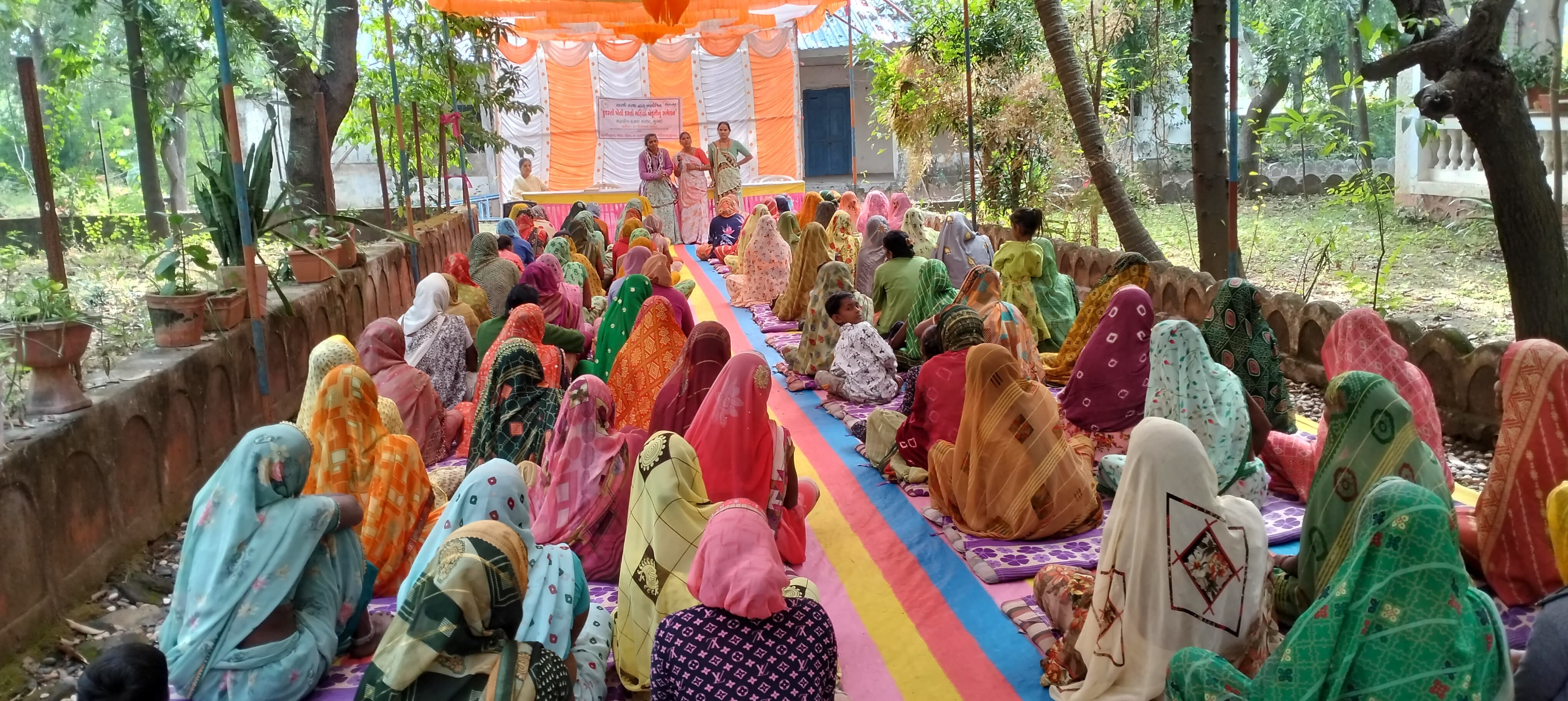Women’s Health
The health situation of women is dire, and general awareness about women’s health is very low. Recognizing the need for empowerment in this area, SARTHI has initiated a women-centered health model with several programs. This model adopts a self-help approach, placing the “self” — the patient — at the center. It challenges harmful concepts associated with the female body, such as shame and pollution, and encourages women to explore and take control of their bodies. The approach also seeks to break down hierarchies between female patients and (male) doctors. By bringing healthcare services to the villages and training traditional midwives (dais), Arogya Sakhis, local healers, and village volunteers, SARTHI ensures that village women feel comfortable and not intimidated. The model takes a holistic approach, empowering patients while incorporating traditional local herbal medicines.
Rural Health Service Through Dais
SARTHI’s Dais program trains local birth attendants to promote safe motherhood practices in remote villages with limited medical resources. The program focuses on safe deliveries, prenatal and postnatal care, immunization, and recognizing risky pregnancies. Training is tailored to illiterate rural women, and includes skills such as administering tetanus vaccines and referring high-risk cases to doctors. SARTHI has trained 210 dais in the program villages. Dais meets quarterly to share experiences and discuss challenges.
Women’s Health Care Through Arogya Sakhi
The Arogya Sakhi (Female Health Friend) program was created to support rural, illiterate women who hesitate to seek medical help, even for serious conditions. Arogya Sakhis provide safer deliveries, preventive vaccinations, and health education through regular visits to Self-Help Groups (SHGs), where they discuss reproductive health issues, prescribe basic treatments, and make monthly reports. They refer patients to doctors only for serious conditions but offer primary care for minor ailments like fever, cold, cough, and diarrhea.
Through their sensitive approach, Arogya Sakhis have gained the trust of rural women, who now share more gynecological concerns and seek advice. They treat issues like white discharge, prolapse, menstrual problems, and STDs using traditional herbal remedies. Arogya Sakhis also facilitate SHG meetings to discuss women’s health. SARTHI has trained 205 midwives to work as a Arogya Sakhi who providing the services in 205 villages.
Health service through local healers
In the past, rural and tribal people preferred expensive city-based treatments for even minor ailments, making it difficult to encourage the use of local Ayurvedic remedies. The goal of training local healers is to enhance their knowledge of local herbs and motivate the community to use them. The program gathers information on traditional herbal practices and medicinal trees.
Local healers, typically educated rural residents, provide natural remedies and inform patients about nearby herbal treatments. They are trained in preparing medicines, dosages, and usage based on age and needs. Healers meet monthly and quarterly to discuss available herbs and share experiences.
SARTHI selects healers who are interested in health services, have good rapport with villagers, and are self-employed. SARTHI has trained 124 local healers from 60 villages. Villagers, including Self-Help Groups, now recognize the value of local herbs and accept healers for their cost and time efficiency.
Awareness program on Safe Drinking water
The tribal people of Santrampur block of Panchmahals district were not fully aware of the importance of safe drinking water, which has led to several health issues. Consuming contaminated water can result in waterborne diseases such as diarrhea, cholera, and typhoid, which disproportionately affect children and vulnerable populations. Lack of awareness about proper sanitation and water treatment increases the risk of infections and contributes to poor overall health, leading to higher mortality rates and reduced quality of life. Educating the community on safe drinking water practices is crucial for improving their health and well-being.
SARTHI has initiated efforts to raise awareness in the community about the importance of safe drinking water by organizing camps at the village level. These camps focus on educating people about the proper use of drinking water from handpumps, hand hygiene, regular nail trimming, keeping water covered, and filtering water through cotton cloth. We created slogans and prepared IEC materials to further educate the villagers.
Installation of Handpumps and Repairing of Handpumps:
The availability of handpumps in the remote villages was insufficient. Due to the hilly terrain, the government drilling machine could not reach suitable sites, which limited the benefits of handpump water for the tribal community. As a result, they continued to use water from open wells and ponds, which affected their health. SARTHI initiated a program to provide safe drinking water by installing handpumps in rural and remote villages, involving the local community and beneficiaries. More than 500 handpumps have been installed by SARTHI, and local youth have been trained to repair and maintain the handpumps, ensuring the program's sustainability.
Achievement of all over Health program
- No. of trained Dai : 210
- No. of Arogya Shakhi : 120
- No. of Healers : 160
- No. of trained village health & sanitation committee : 334
- No. sensitized RMP for Diarrhea alleviation in children :1000
- Adolescents Camps for Non Schools going Youth : 240
- Adolescents Camps for Schools going Youth : 1160
- HIV/Aids Awareness Camps : 829
- Safe Motherhood Camp : 226
- Health Clinic & Camps for Child and Women : 810
- Gynecological / Medical Camp / Eye Camp : 50
- Camps with Homeopathic & Ayurvaidic Practitioner : 12
- Camps with Newly Married Couples : 72
- Gender Sensitization Camps :360
- Mass Awareness camps(Swachh Bharat Abhiyan :01
- RKSK- Village Health Day :15
- RKSK- Health Clinic :12
- Construction of Low Cost Latrine :2196




